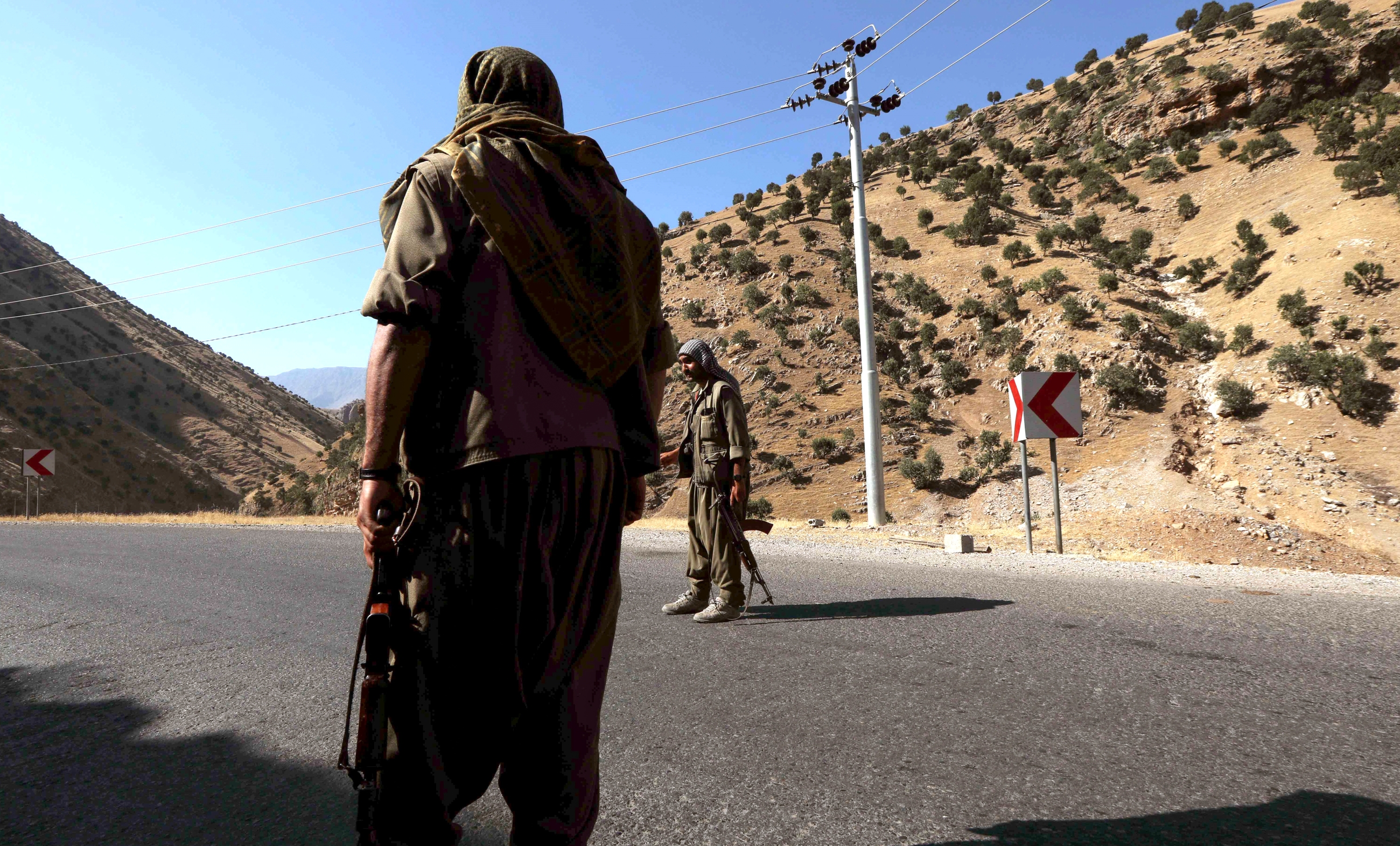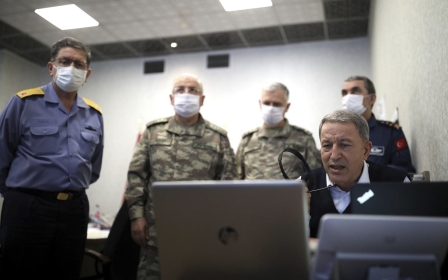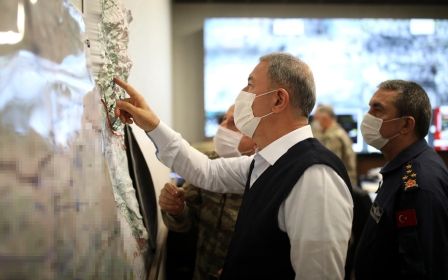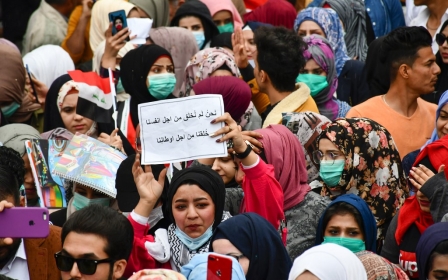Fear and anger greets Turkish air strikes in northern Iraq

Turkish air strikes against alleged PKK targets in northern Iraq have caused civilian casualties and spread fear in refugee camps in the area, residents and officials have told Middle East Eye.
On Sunday 14 June, Turkey's Defence Ministry announced the launch of a large aerial operation dubbed “Operation Claw-Eagle”, nominally targeting the strongholds of the PKK in Qandil, near the Iranian-Turkish border, as well as Zap, Avasin and Hakurk, Sinjar and Makhmour.
The ministry claimed that “81 PKK targets were struck, including shelters and caves”, and that a large number of PKK militants had been "neutralised". But civilians told Middle East Eye that most of the air strikes in Sinjar - home of the embattled Yazidi minority - and Makhmour refugee camp, targeted civilians.
The Makhmour camp in north-central Iraq was first established in 1998 and hosts more than 12,000 refugees, mainly composed of Kurds fleeing the long-running conflict between the Turkish state and the Kurdistan Workers Party (PKK), who have their bases in the Qandil mountains in northern Iraq.
'No international laws allow Turkey to bomb a UN-sponsored civilian camp. The bombardment is an attempt by the Turkish government to massacre the Kurdish refugees who fled persecution in Turkey'
- Bewar Amin, Makhmour camp
“On late June 15 night, the Turkish warplanes bombarded the surroundings of Makhmour refugee camp for almost one hour, hovering with a low altitude and causing fear and panic among women, children and elderly Kurdish displaced people,” Bewar Amin, head of Makhmour refugee camp’s communications committee told MEE via a phone interview.
New MEE newsletter: Jerusalem Dispatch
Sign up to get the latest insights and analysis on Israel-Palestine, alongside Turkey Unpacked and other MEE newsletters
“No international laws allow Turkey to bomb a UN-sponsored civilian camp. The bombardment is an attempt by the Turkish government to massacre the Kurdish refugees who fled persecution in Turkey. We call on the UN, the Iraqi government to protect us.”
He said there were no casualties as a result of the air strikes, but there was some damage to the camp. He refuted Turkish claims that the camp contained PKK militants as “totally untrue”. Three people were killed as a result of a Turkish air strike on the outskirts of the camp on 15 April.
He also accused the Kurdistan Democratic Party (KDP), the ruling party in the autonomous Kurdistan Regional Government (KRG), of imposing an embargo on the camp in line with demands from Turkey.
The PKK released a statement following the strikes, saying “there was no movement or activity of the guerrilla forces in Makhmour and [Sinjar] regions that were shelled by Turkish jets last night … guerrillas suffered no losses.”
Four civilians were killed on Friday when a Turkish air strike hit their cars in the Shiladzi subdistrict of Duhok province, AFP and Rudaw reported.
Another shepherd was killed early on Thursday morning as a result of a Turkish air strike in the Bradost district of Erbil.
MEE contacted Hemn Sleman, a spokesman for the Duhok police, but he declined to comment on the incident. MEE also contacted Warshin Barwari, mayor of Shiladze, but he was not available to comment.
Sinjar attacks
Among the targets struck by the Turkish warplanes was Sinjar Mountain and its surroundings.
The mountain has been home to around 2,500 Yazidi refugees since 2014, when the Islamic State group rampaged across the province, killing thousands in what the UN has since called a genocide.
Four members of the Shengal Resistance Units (YBS), a Yazidi armed group established in the wake of IS’s takeover of Sinjar, were wounded during the Turkish air raids.
Though Turkey accuses the YBS of being an offshoot of the PKK, the YBS currently takes direct orders from the Iraqi federal government.
After the IS attacks against the people of Sinjar, the PKK came to the aid of the Yazidi minority, but withdrew their forces in March 2018 following Turkish threats of a cross-border incursion to the area.
“In the Turkish air strikes on Sinjar Mountain a civilian working as a journalist has been wounded,” a local from Sinjar, who wished not to be named because of possible reprisal, told MEE.
'People of Sinjar live in fear and worry due to the Turkish bombing; their woes worsened by high rates of unemployment and the coronavirus pandemic'
- Sinjar local
“People of Sinjar live in fear and worry due to the Turkish bombing; their woes worsened by high rates of unemployment and the coronavirus pandemic. The air strikes hindered the return of the Yazidis to their hometown of Sinjar.”
Nadia Murad, a Yazidi survivor of the 2014 genocide and Nobel peace prize laureate, tweeted on 15 June, “Mount Sinjar is a war zone right now. Turkish fighter jets are bombing multiple locations. Over 150 Yazidi families had just returned to their homes.”
She questioned when the Iraqi government and the international community would “apply some courage and political will to resolving security challenges in Sinjar?”
'Operation Claw-Tiger'
Turkey’s Defence Ministry on Wednesday announced “Operation Claw-Tiger” and deployed special forces in the KRG's Haftanin region, 15km from the Turkish border.
Clashes have continued between the Turkish forces and the PKK guerrillas, while Turkish jets have continued striking several areas in Duhok, and Erbil.
Another civilian from the town of Sinone in Sinjar - speaking on condition of anonymity - told MEE that locals were feeling increasing fearful about the Turkish air strikes and Turkish deep land offensives into the Kurdistan region’s territories. He said that they have not seen any PKK militants in the Sinjar area.
'The Iraqi government has not been able to evict Turkish troops based in camps in the Kurdistan region as there have been undisclosed agreements made between Ankara and the KDP'
- Sajad Jiyad, analyst
For its part, Iranian artillery on Wednesday and Thursday shelled border areas in Haji Omaran district in Erbil province, pushing farmers and villagers to flee in fear of their lives.
“Turkish incursions and air strikes on Iraqi territory have been a constant issue for the Iraqi foreign ministry since 2003, with no resolution in sight," Sajad Jiyad, a political analyst based in Baghdad, told MEE. "The Turkish government refers to Saddam-era agreements that purportedly allow it to pursue the PKK in Iraqi territory.
“The Iraqi government has not been able to evict Turkish troops based in camps in the Kurdistan region as there have been undisclosed agreements made between Ankara and the KDP. The same applies to Iranian shelling in Iraqi territory; the Iraqi government is powerless to stop it.”
A secret agreement?
Iraq's Joint Operations Command on 15 June condemned the Turkish air strikes in a statement, describing them as an “awful breach of Iraq’s sovereignty", calling on the Turkish side not to repeat them and expressing Iraq’s readiness to cooperate between both states to “control security situations on the joint borders”.
The Iraqi foreign ministry on Thursday summoned the ambassadors of Turkey and Iran and submitted two separate letters of protest against the Turkish violations against Iraq’s sovereignty as well as Iranian artillery bombardment of the region’s border villages, calling on both neighbours to respect the sovereignty of Iraq and to stop undertaking such actions.
The ministry also affirmed that no armed group should use Iraqi territories “as a passage or corridor to cause harm to neighbouring countries”.
However, it appears that Turkish and Iraqi officials may have discussed the operations in advance, as days before the head of the National Intelligence Organisation (MIT), Hakan Fidan, had secretly visited Baghdad.
“This is not the first time Turkey launched attacks, we are not for breaching Iraq’s territories by any state - meanwhile we are also against any side that gives excuses to any other state to disrespect Iraq’s sovereignty,” Nasir Harkey, Iraqi MP from the ruling KDP and a member of the Iraqi parliament's defence and security committee, told MEE.
He also said that the Iraqi government should defend the country’s borders.
On Friday, Jotyar Adil, the KRG’s ofcial spokesperson, in a statement condemned the killing of civilians during the Turkish military operations, and called on Turkey to respect “the sovereignty of our lands and homeland”.
He also called on the PKK to withdraw from the Kurdistan region’s border areas and not use its territories to launch attacks on neighbouring states.
Shakhawan Rauf, head of the internal security committee from the Change Movement’s faction in the Kurdistan parliament, told MEE: “Our committee’s stance is that we denounce the Turkish air strikes and aggressions against the region’s territories, and targeting civilians on the pretext of the existence of PKK guerillas.
"We think Turkish and Iranian bombardments are contrary to the Iraqi constitution and Kurdistan’s internal laws.
“Both the Iraqi federal government and the KRG should deal with the situation.”
Middle East Eye delivers independent and unrivalled coverage and analysis of the Middle East, North Africa and beyond. To learn more about republishing this content and the associated fees, please fill out this form. More about MEE can be found here.




